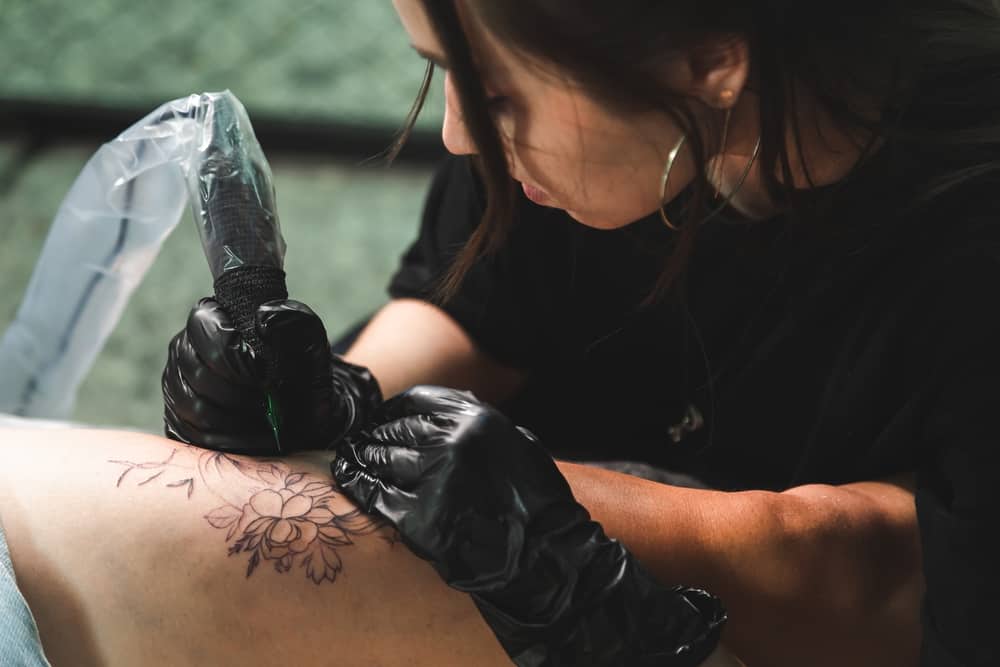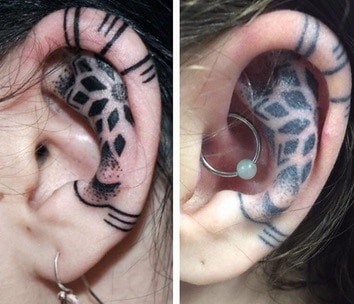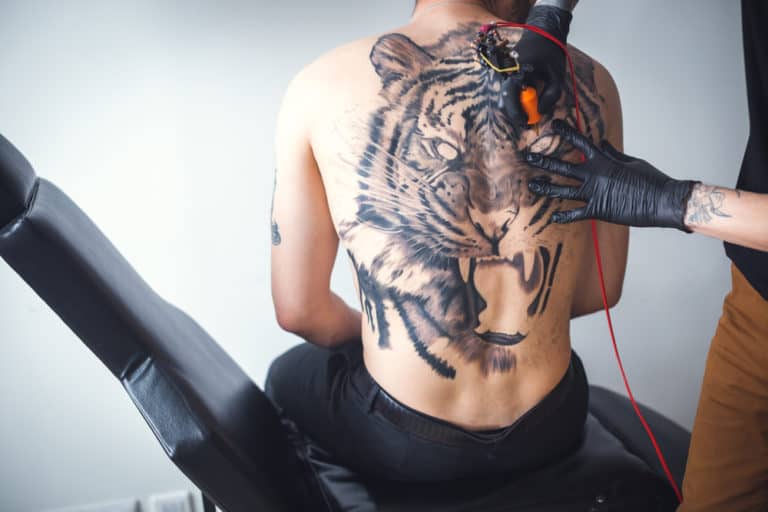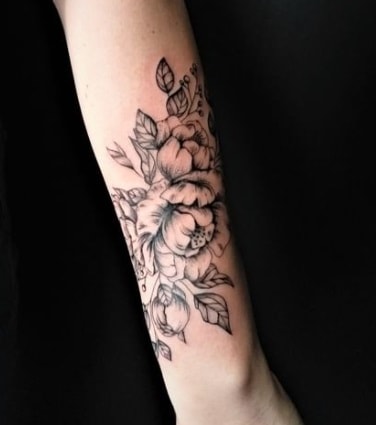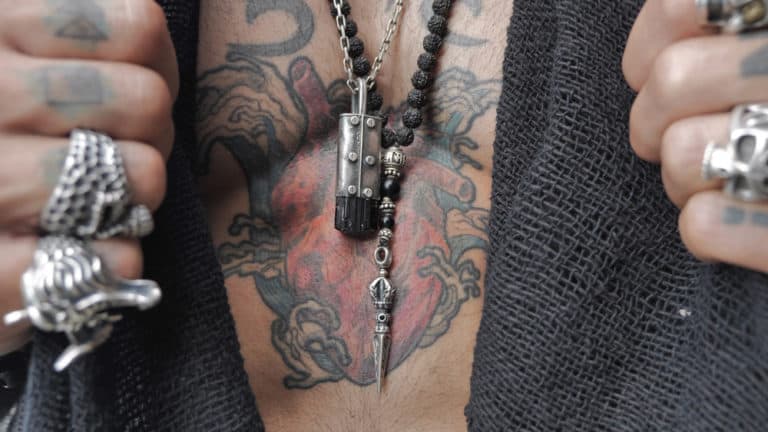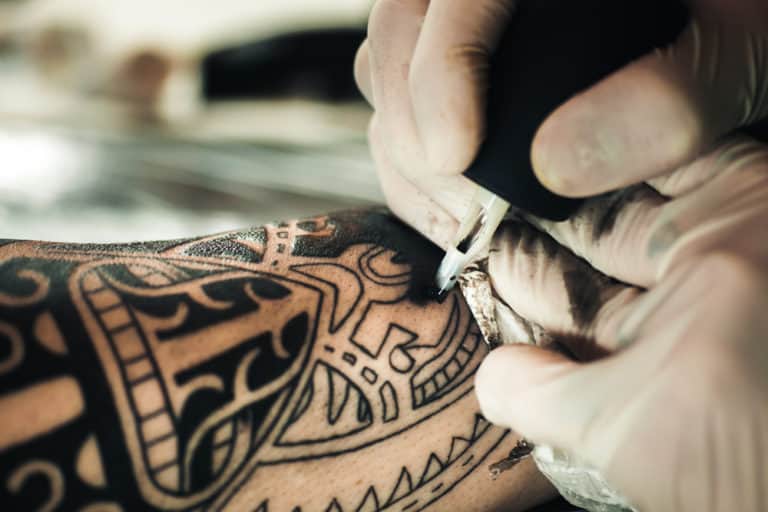What Medications Should You Not Take Before A Tattoo?
Getting a tattoo is as much a medical procedure as it is an artistic expression. Consequently, the tattoo process can be a painful procedure that includes the injection of foreign material into the body as well as deliberate scarification. So what medication should you not take before getting a tattoo?
Before getting a tattoo, you should avoid any medication which will thin your blood, make your skin sensitive, have rejection properties, and/or have anti-rejection properties. Therefore you should avoid taking acne medication, antibiotics, anti-rejection medication, blood thinners, and painkillers.
Along with avoiding certain medications before getting a tattoo, there are certain medical conditions that your tattoo artists need to be aware of to make sure you receive your tattoo safely. Further to the above, there are methods of preparing for a tattoo and caring for a tattoo, which must be followed safely:
What Medication Should I Avoid Before Getting A Tattoo?
While the following medications are not a definitive list, these are the most common types of medication that should be avoided before you get a tattoo:
- Acne medication,
- Antibiotics,
- Anti–rejection medication,
- Blood thinners,
- Painkillers.
Acne Medication
Acne medication such as Accutane often results in overly sensitive skin, as well as skin with a tendency to dry out and flake.
Consequently, people on acne medication should avoid getting tattoos as they are likely to experience increased levels of pain during the tattooing process, where after the skin’s ability to heal is significantly hampered.
The inability of the skin to heal efficiently after receiving a tattoo can lead to scarification and other risks, such as the increased chance of infection.
Antibiotics
Antibiotics have been known to increase the skin’s sensitivity resulting in increased pain during the tattooing process. However, a more significant concern with people on antibiotics wanting to get a tattoo is that it puts increased pressure on the body’s ability to heal from a bacterial infection.
The reason why getting a tattoo hampers your body’s healing ability is that the inclusion of thousands of tiny puncture wounds from a tattoo gun results in various entry points for germs, bacteria, and viruses to enter the body.
In the event that external bacteria enter the body, your body’s immune system will have to combat the bacteria already present within the body and any foreign bacteria entering the body.
In conclusion, punishing your immune system with foreign bacteria while it is already struggling to deal with internal bacteria (hence the prescription of antibiotics) may lead to a compromised immune system and an increased risk of illness/medical complications.
Anti-Rejection Medication
Commonly prescribed in the event of an organ transplant or a similar procedure, anti-rejection medication is used to welcome a foreign host into the body by mitigating your immune system’s response to an external threat.
Because getting a tattoo requires the piercing of the skin resulting in the deliberate inclusion of a foreign body via ink and creating a means by which unwelcome foreign bodies can enter the body, you should avoid getting a tattoo on anti-rejection medication.
The reason being is that if contaminated tattoo ink enters the body or dangerous foreign bodies enter the body through pierced skin, you may be at increased risk of infection or illness due to a medically induced compromised immune system.
Blood Thinners
During the tattoo process, minor bleeding is a common occurrence due to the penetration of your skin by a tattoo needle. However, if you are on blood thinners, this may result in a dangerous loss of blood during and after getting a tattoo.
Furthermore, even if increased bleeding does not pose a health risk, the constant need for tattoo artists to wipe away excessive blood will likely result in a poorly rendered tattoo compared to a tattoo that had been completed under a regular flow of blood.
Painkillers
Because getting a tattoo can be a painful process, some people opt to take over-the-counter painkillers before getting a tattoo to help ease the pain.
However, not only has this been shown to have a negligible effect on the pain experienced during the tattoo process, but most over-the-counter painkillers have a blood-thinning effect (such as aspirin or ibuprofen.)
Consequently, all the risks associated with taking blood thinners before a tattoo, such as excessive bleeding, apply to people who choose to take painkillers before getting a tattoo.
What Medical Conditions Will Not Allow Me To Get A Tattoo?
Although there aren’t many medical conditions that will stop a person from getting a tattoo, there are some medical conditions that make getting a tattoo potentially dangerous. Some common examples are:
- Pregnancy,
- Blood clotting disorders,
- Immunocompromised people, and
- Chronic skin conditions.
Pregnancy
Although the risk of harm while getting a tattoo while pregnant is very low, the chance of contracting an infection/disease such as HIV or Hepatitis B from a tattoo needle means that you should choose not to get a tattoo while pregnant.
While most reputable tattoo parlors have little to no chance of infecting clients with the aforementioned conditions, these conditions can be passed onto a pregnant person’s child, making the reduction of risks a priority.
Furthermore, there is some evidence that suggests stress endured by a person during the tattooing process and the introduction of foreign tattoo ink into the body may be detrimental to the development of a child – especially during the first three months of pregnancy.
Blood Clotting Disorders
While people with blood clotting disorders such as hemophiliacs have been known to get tattoos safely and without any complications, the risk of excessive bleeding during the tattoo process can create a host of problems for both the artist and the client.
Consequently, make sure to speak to your doctor about getting a tattoo if you have a blood clotting disorder and to inform your artist about your condition so that they can plan accordingly (such as reducing the size of the tattoo or getting the tattoo over short, multiple phases.)
Immunocompromised People
Because tattooing requires the piercing of the skin with a needle and the injection of foreign material into the body, immunocompromised people with conditions such as HIV should be cautious when getting a tattoo.
The reason why immunocompromised people should be careful and speak to their doctor before getting a tattoo is that exposing the skin to external bodies may increase the risk of harmful bacteria, viruses, and pathogens entering the body.
Although this is seldom a cause of concern for regular immune systems, immunocompromised people may struggle to fight infections or illnesses caused by the willing and unwilling exposure to foreign bodies entering the body.
Chronic Skin Conditions
Certain skin conditions such as psoriasis or eczema may become worse in the event that an affected area is tattooed. Furthermore, tattooing someone with a chronic skin condition may cause the Kobner phenomenon.
Korner phenomenon is when any/all trauma applied to the skin results in inflammation, soreness, tenderness, and triggering of the underlying skin condition to the inflicted area.
How Can I Safely Prepare For Getting A Tattoo?
Over and above the avoidance of specific medication before getting a tattoo, there are certain things one should and shouldn’t do before getting a tattoo.
What should you avoid before getting a tattoo?
- Alcohol,
- Caffeine,
- Sun exposure,
- Dairy and sugar,
- Getting a razor cut, and
- Wearing tight clothes.
Avoid Drinking Alcohol
You must avoid drinking alcohol before getting a tattoo. The reasons you should avoid getting a tattoo after drinking alcohol are because:
- Alcohol dehydrates you,
- Alcohol causes involuntary jitters and movements,
- Alcohol thins your blood.
Avoid Caffeine
Similar to alcohol, caffeine is a diuretic and a stimulant that causes similar issues to alcohol:
- Caffeine dehydrates you,
- Caffeine causes involuntary jitters and movements,
- Caffeine thins your blood.
Avoid Sun Exposure
You should avoid getting a tattoo after lengthy sun exposure; not only will sun exposure cause dehydration and possible headaches/sunstroke, but it also damages your skin.
The primary forms of skin damage resulting from sun exposure include dry skin, peeling skin, and sensitive skin, all of which will negatively affect the final appearance of the tattoo and the body’s efficiency in healing from a tattoo.
Avoid Dairy And Sugar
Studies suggest that the consumption of dairy and sugar can result in a slower healing process, as well as a result in the bloating and expansion of skin. Skin that is bloated and expanded, especially around the abdomen, makes the tattooing process much harder for the artist.
Consequently, experts advise substituting dairy and sugar for healthier food options such as foods that are rich in vitamin C, complex carbohydrates, protein, and fiber.
Don’t Get A Razor Cut
While it is common knowledge that tattooing requires smooth skin that is free from any hairs, shaving with a razor before getting a tattoo is not recommended; this is because a razor cut can result in raised skin, sensitive skin, and razor burn.
Consequently, you should instead clear the area of hair with a safe to use hair removal product or an automatic shaver. If you are uncertain how to remove a zone of hair safely and efficiently, ask your tattoo artist if they can do it on your behalf.
Don’t Wear Tight Clothes
When getting a tattoo, make sure to substitute tight clothes with loose-fitting clothing, as this allows you and your artist freedom of movement while also allowing both your skin and blood circulation freedom of movement to promote healing.
What should you do before getting a tattoo?
- Schedule a consultation,
- Be clean and hydrated,
- Get plenty of sleep.
Schedule A Consultation
Before getting a tattoo, it is vital that you book a consultation with the artist in advance, as this allows you to:
- Build a relationship with the artist and determine if you like their work,
- Determine the size, shape, style, and placement of your tattoo,
- Assess the premise and its hygiene standards,
- Get an insight into the parlor and read any/all online reviews,
- Disclose any medical conditions/concerns with the tattoo artist.
Be Clean And Hydrated
It is essential and respectful that you take the time to remain clean and hydrated before getting a tattoo, as this makes the tattoo process more accessible and more comfortable for you and the artist:
- Take a shower beforehand, taking care to scrub the area being tattooed,
- Keep your skin moisturized with lotion,
- Drink plenty of water and/or isotonic drinks.
Get Plenty Of Sleep
Before getting a tattoo, make sure to get upwards of eight hours of quality sleep the night before. Sleep is essential in assisting the healing process while helping you calm any jitters/concerns before getting your tattoo.
How Can I Safely Heal From Getting A Tattoo?
Once you have gotten your tattoo and bleeding has subsided, you can choose to take certain painkillers or apply ointments for sensations such as burning, itching, or pain without worrying about adverse effects.
However, the essential step to take when getting a tattoo is to follow standard hygiene and wound precautions:
- Leave your medical-grade bandage on for two days or until your tattoo has stopped oozing plasma,
- Make sure to always clean your hands and tattoo with liquid soap for the first few weeks after getting a tattoo (not bar soap which can house bacteria),
- Pat your tattoo dry with disposable paper towels, not regular cloth towels,
- Use a reputable brand of tattoo balm to moisturize the skin,
- Avoid bathing and tanning.
Conclusion
In conclusion, although most medications and medical conditions will not negatively affect the tattoo process or the healing process, it is advisable that you consult with your doctor and artists before getting a tattoo to mitigate any risks.
Furthermore, there are fundamental lifestyle changes you should implement before, during, and after getting a tattoo to ensure an effective healing process, most of which shouldn’t require any medication such as painkillers.
Some of my favorite designs, tattoo books, and aftercare products, selected for you
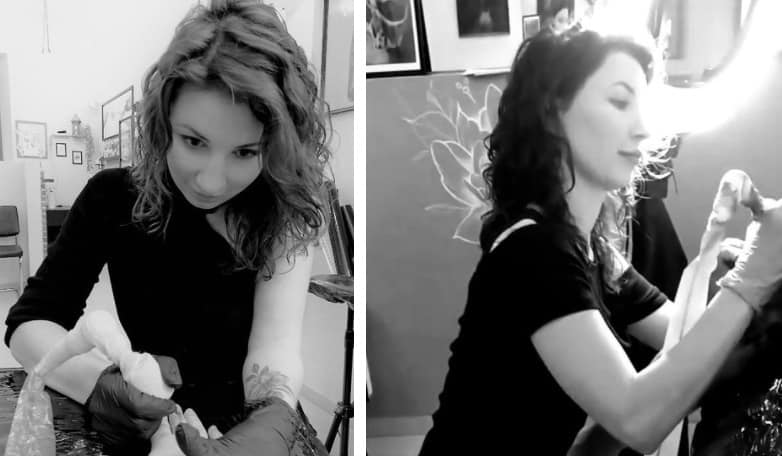
Thank you for reading my article, I hope that you have found it helpful. If you would have trouble finding ideas for your tattoo, wonder what is meaning of design that you have found or what to buy for aftercare, to make sure that your tattoo will be healing quickly and easily, here are some of my favorite products in one place, hope that this will also help.
Design and tattoo ideas
For some ideas you can have a look at those 3 books with hundreds of designs that I use with my clients, they are available on Amazon for Kindle or in classic, paper version (links below):
- Great Book of Tattoo Designs, Revised Edition: More than 500 Body Art Designs (Fox Chapel Publishing) Fantasy, Celtic, Floral, Wildlife, and Symbol Designs for the Skin by Lora Irish
- The Big Book of Small Tattoos – Vol.1: 400 small original tattoos for women and men by Roberto Gemori
- Tiny Tattoos: Over 1,000 Small Inspirational Artworks by Rebecca Vincent.
Tattoo meaning
If you would like to read more about the meaning of different tattoo styles and designs before you will decide what you would like to have, I can recommend a book that was really useful for me when I was starting my tattoo adventure – it’s “Conscious Ink: The Hidden Meaning of Tattoos” by Lisa Barretta (through the link you can find it on Amazon for around $10).
Tattoo aftercare
The skin at the tattoo site often dries out. To prevent it and speed up healing for my clients, I usually recommend one of those tattoo aftercare balms (you can find them on Amazon):
Some of my favorite designs, tattoo books, and aftercare products, selected for you

Thank you for reading my article, I hope that you have found it helpful. If you would have trouble finding ideas for your tattoo, wonder what is meaning of design that you have found or what to buy for aftercare, to make sure that your tattoo will be healing quickly and easily, here are some of my favorite products in one place, hope that this will also help.
Design and tattoo ideas
For some ideas you can have a look at those 3 books with hundreds of designs that I use with my clients, they are available on Amazon for Kindle or in classic, paper version (links below):
- Great Book of Tattoo Designs, Revised Edition: More than 500 Body Art Designs (Fox Chapel Publishing) Fantasy, Celtic, Floral, Wildlife, and Symbol Designs for the Skin by Lora Irish
- The Big Book of Small Tattoos – Vol.1: 400 small original tattoos for women and men by Roberto Gemori
- Tiny Tattoos: Over 1,000 Small Inspirational Artworks by Rebecca Vincent.
Tattoo meaning
If you would like to read more about the meaning of different tattoo styles and designs before you will decide what you would like to have, I can recommend a book that was really useful for me when I was starting my tattoo adventure – it’s “Conscious Ink: The Hidden Meaning of Tattoos” by Lisa Barretta (through the link you can find it on Amazon for around $10).
Tattoo aftercare
The skin at the tattoo site often dries out. To prevent it and speed up healing for my clients, I usually recommend one of those tattoo aftercare balms (you can find them on Amazon):
References
- https://rightasrain.uwmedicine.org/life/leisure/thinking-getting-tattoo-heres-what-you-should-know
- https://www.savedtattoo.com/what-should-you-not-do-before-getting-a-tattoo/
- https://www.thekitchenmagpie.com/how-to-prepare-for-your-tattoo/
- https://www.self.com/story/before-you-get-your-first-tattoo
- https://www.byrdie.com/the-importance-of-full-medical-disclosure-to-your-tattoo-artist-3189370
- https://www.healthline.com/health/do-tattoos-hurt#minimizing-pain

